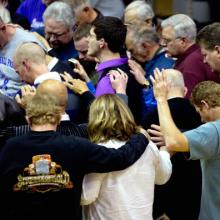storms
Neighborhoods across the state — some lined with million dollar homes, others by more modest dwellings — went cold and dark for days as Texas struggled to keep the power on during a dangerous winter storm. But while the catastrophe wrought by unprecedented weather was shared by millions left shivering in their own homes, the suffering was not equally spread.
As creation cries out to us, let us listen, let us learn,
let us open our hearts to those devastated by the storms
and open our minds to care for creation.
President Obama is visting New Orleans today, the site of catastrophic damage caused by Hurricane Katrina in 2005, to honor 10 years of rebuilding and growth since the storm.
The President is expected to comment on the pain, trauma, and destruction still evident, even while offering words of hope and admiration for the regrowth evident in the city over the last decade.
According to the prepared remarks, reports The Times-Picayune, Obama will comment on the failure of government to "look out for its own citizens."
Below are some of the challenges facing New Orleans today, as well as points of rebuilding and hope in the city ten years after Hurricane Katrina.
THE NEWS IN mid-May was grim: Scientists announced that melt across the West Antarctic was proceeding much faster than before. In fact, they said that at this point the melt of the six great glaciers fronting Amundsen Bay was “unstoppable,” and that over a number of decades it would raise sea levels by 10 feet or more.
This is another way of saying: Given dominion over the earth, we’ve failed. We’ve taken one after another of the planet’s great physical features and wrecked them. The Arctic? Summer sea ice is reduced by 80 percent, and it’s an every-year affair now to boat through the Northwest Passage, impassably choked by ice until this millennium began. The seven seas? Thirty percent more acidic than they were in the past—and the acidity could double or triple by the end of the century. The Antarctic? It’s not just warming rapidly, but its wind patterns have been changed by the ozone hole in ways that amplify the heating. Storms are stormier, droughts are deeper, fires last longer, rain falls harder.
And all because it was a little easier and a little cheaper not to change off fossil fuels. When scientists sounded the alarm about all this in the late 1980s, the atmospheric concentration of carbon dioxide was about 350 parts per million—or what we now consider the upper bound of safety. If we’d heeded their fervent warnings, we’d have moved with great speed to convert to solar and wind power. We’d have parked our SUVs. We’d have insulated every home in the world. It would have cost money and it would have been inconvenient; on the other hand, it could have bred solidarity in much the same way that preparing for World War II transformed the U.S.
HILDEGARD BLEW in on a late summer storm. Sleek and ebony, eyes a bright chatoyant gold. Between the Supercans and downed tree limbs, she was scratching up worms, plucking at bugs. In this nation’s capital of a little more than 600,000 souls, a loose hen was highly unusual—but there she was, in all her Gallus gallus domesticus glory.
Of course, she didn’t arrive with the name Hildegard. And certainly not Hildegard von Chicken, after a favorite Rhineland mystic. That came later. After she’d been interviewed and photographed for the DCist news blog; after she’d become a destination point for recently migrated hipsters; and after a woman running for local office asked if she could take Hildegard on the campaign stump to make her candidacy “more memorable.”
Hildegard received her name after a chance encounter with La Señora at the 11th street bus stop. “I rescued a chicken,” I told her. “What color?” she shot back.
La Señora is in her 70s and from Paraguay. She is knowledgeable about many things. “Black ... with a green undersheen,” I said. “This is very good. You have most likely rescued it from a religious ritual where it would be sacrificed for evil intentions.” “Wow!” I replied. “What should I do?” La Señora stared at me a moment: “You must pray the rosary with the chicken. Hold her and pray the rosary.”
THIS WAS THE series of curious events that led to my being perched on porch steps on a hill in the imperial city of Washington, D.C., holding my grandmother’s rosary and praying with a chicken, whose name I decided should be Hildegard, “Sybil of 11th Street,” because she was consulted by so many of high and low estate.
To understand American politics, follow the money. But to understand American goodness and resolve, follow the storms.
Watch towns rally to save children and to provide emergency shelter. Watch people share water and food with strangers. Watch people share chain saws and rowboats. Watch religious communities collect offerings of money and supplies.
Watch people stop work in order to pile sandbags along cresting rivers. Watch hard-hit towns discover their core oneness. All those fears of the dreaded "other" that politicians try to whip up seem to evaporate when storms hit.
When our host led prayers for the victims of the tornadoes, no one asked if they were "our kind of people." They were victims, and that's all we needed to know. While politicians raged across the landscape shouting invectives, rekindling old grudges, stirring pots of fear and distrust, and seeking votes in hardship, actual victims of hardship were joining hands to serve the least of these.




